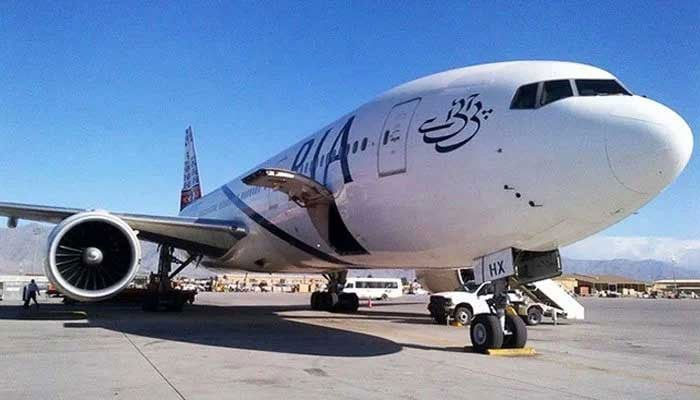Airline’s privatization: PIA employees join bidding race as two more submit offers
Bid is jointly filed by Hidayatullah Khan, President of CBA-affiliated People’s Unity, and Aqeel Siddiqui, head of PIA SASA
ISLAMABAD: Employees of Pakistan International Airlines (PIA) have submitted a joint offer to acquire the national flag carrier, adding to the growing list of bidders ahead of the June 19 deadline, officials from the Privatization Commission confirmed Monday.
The bid was jointly filed by Hidayatullah Khan, President of the CBA-affiliated People’s Unity, and Aqeel Siddiqui, head of the PIA Senior Staff Association (SASA). The employees argue they should have the first right to purchase the airlines, which the federal government is seeking to privatise after a previous attempt failed.
In addition to the employees’ bid, Fauji Fertilizer Company Limited has also submitted an offer to acquire PIA, according to officials familiar with the matter.
Fauji Fertilizer Company Limited (FFC), one of Pakistan’s top fertilizer firms, has submitted an Expression of Interest (EoI) and prequalification documents to the Privatization Commission seeking a stake in Pakistan International Airlines Corporation Limited (PIACL), FFC announced Monday.
At a board meeting on June 13, FFC approved the move and plans to conduct full due diligence as Pakistan’s government works to sell 51–100 percent of its shares to shore up its $7billion IMF-backed reform programme.
Last month, the government extended the EoI deadline to June 19, following a failed first attempt last year when only one bid — well below the Rs85 billion asking price — was received from Blue World City consortium.
Previously, prominent business groups including Mian Mansha Group, Arif Habib Group, and the Tabba Group had also expressed interest in acquiring the debt-laden airline.
PIA’s privatisation is part of a broader government strategy to offload loss-making state-owned enterprises and stabilise public finances amid mounting economic challenges.
-
 'Elderly' Nanny Arrested By ICE Outside Employer's Home, Freed After Judge's Order
'Elderly' Nanny Arrested By ICE Outside Employer's Home, Freed After Judge's Order -
 Keke Palmer On Managing Growing Career With 2-year-old Son: 'It's A Lot'
Keke Palmer On Managing Growing Career With 2-year-old Son: 'It's A Lot' -
 Key Details From Germany's Multimillion-euro Heist Revealed
Key Details From Germany's Multimillion-euro Heist Revealed -
 David E. Kelley Breaks Vow To Cast Wife Michelle Pfeiffer In 'Margo's Got Money Troubles'
David E. Kelley Breaks Vow To Cast Wife Michelle Pfeiffer In 'Margo's Got Money Troubles' -
 AI-powered Police Robots To Fight Crime By 2028: Report
AI-powered Police Robots To Fight Crime By 2028: Report -
 Everything We Know About Jessie J's Breast Cancer Journey
Everything We Know About Jessie J's Breast Cancer Journey -
 Winter Olympics 2026: What To Watch In Men’s Hockey Today
Winter Olympics 2026: What To Watch In Men’s Hockey Today -
 Winnie Harlow Breaks Vitiligo Stereotypes: 'I'm Not A Sufferer'
Winnie Harlow Breaks Vitiligo Stereotypes: 'I'm Not A Sufferer' -
 Apple Martin Opens Up About Getting 'crazy' Lip Filler
Apple Martin Opens Up About Getting 'crazy' Lip Filler -
 Why Did OpenAI Remove One Crucial Word From Its Mission Statement?
Why Did OpenAI Remove One Crucial Word From Its Mission Statement? -
 Prince William Warned His Future Reign Will Be Affected By Andrew Scandal
Prince William Warned His Future Reign Will Be Affected By Andrew Scandal -
 Amy Madigan Reflects On Husband Ed Harris' Support After Oscar Nomination
Amy Madigan Reflects On Husband Ed Harris' Support After Oscar Nomination -
 Is Studying Medicine Useless? Elon Musk’s Claim That AI Will Outperform Surgeons Sparks Debate
Is Studying Medicine Useless? Elon Musk’s Claim That AI Will Outperform Surgeons Sparks Debate -
 Margot Robbie Gushes Over 'Wuthering Heights' Director: 'I'd Follow Her Anywhere'
Margot Robbie Gushes Over 'Wuthering Heights' Director: 'I'd Follow Her Anywhere' -
 'The Muppet Show' Star Miss Piggy Gives Fans THIS Advice
'The Muppet Show' Star Miss Piggy Gives Fans THIS Advice -
 Sarah Ferguson Concerned For Princess Eugenie, Beatrice Amid Epstein Scandal
Sarah Ferguson Concerned For Princess Eugenie, Beatrice Amid Epstein Scandal




